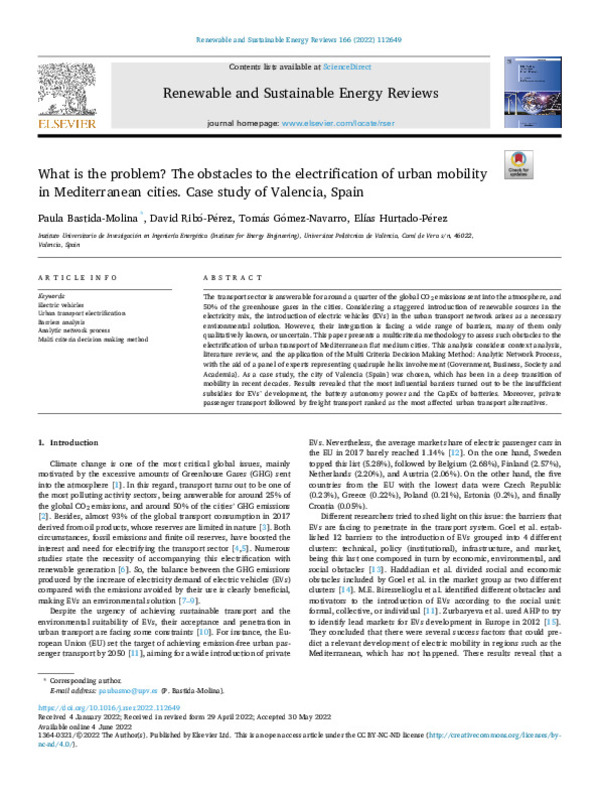JavaScript is disabled for your browser. Some features of this site may not work without it.
Buscar en RiuNet
Listar
Mi cuenta
Estadísticas
Ayuda RiuNet
Admin. UPV
What is the problem? The obstacles to the electrification of urban mobility in Mediterranean cities. Case study of Valencia, Spain
Mostrar el registro sencillo del ítem
Ficheros en el ítem
| dc.contributor.author | Bastida-Molina, Paula
|
es_ES |
| dc.contributor.author | Ribó-Pérez, David Gabriel
|
es_ES |
| dc.contributor.author | Gómez-Navarro, Tomás
|
es_ES |
| dc.contributor.author | Hurtado-Perez, Elias
|
es_ES |
| dc.date.accessioned | 2023-10-05T18:01:58Z | |
| dc.date.available | 2023-10-05T18:01:58Z | |
| dc.date.issued | 2022-09 | es_ES |
| dc.identifier.issn | 1364-0321 | es_ES |
| dc.identifier.uri | http://hdl.handle.net/10251/197776 | |
| dc.description.abstract | [EN] The transport sector is answerable for around a quarter of the global CO2 emissions sent into the atmosphere, and 50% of the greenhouse gases in the cities. Considering a staggered introduction of renewable sources in the electricity mix, the introduction of electric vehicles (EVs) in the urban transport network arises as a necessary environmental solution. However, their integration is facing a wide range of barriers, many of them only qualitatively known, or uncertain. This paper presents a multicriteria methodology to assess such obstacles to the electrification of urban transport of Mediterranean flat medium cities. This analysis considers context analysis, literature review, and the application of the Multi Criteria Decision Making Method: Analytic Network Process, with the aid of a panel of experts representing quadruple helix involvement (Government, Business, Society and Academia). As a case study, the city of Valencia (Spain) was chosen, which has been in a deep transition of mobility in recent decades. Results revealed that the most influential barriers turned out to be the insufficient subsidies for EVs' development, the battery autonomy power and the CapEx of batteries. Moreover, private passenger transport followed by freight transport ranked as the most affected urban transport alternatives. | es_ES |
| dc.description.sponsorship | We really appreciate the help of our ten experts in the field. Without them, we could not have carried out the research. There was no familiarity bias/conflict of interest with them. This work was supported in part by the Spanish Public Administration "Ministerio de Universidades" under the grant Margarita Salas-Universitat Polite`cnica de Vale`ncia (MS/19) , funded by the European Union-Next Generation EU. | es_ES |
| dc.language | Inglés | es_ES |
| dc.publisher | Elsevier | es_ES |
| dc.relation.ispartof | Renewable and Sustainable Energy Reviews | es_ES |
| dc.rights | Reconocimiento - No comercial - Sin obra derivada (by-nc-nd) | es_ES |
| dc.subject | Electric vehicles | es_ES |
| dc.subject | Urban transport electrification | es_ES |
| dc.subject | Barriers analysis | es_ES |
| dc.subject | Analytic network process | es_ES |
| dc.subject | Multicriteria decision making method. | es_ES |
| dc.subject.classification | INGENIERIA ELECTRICA | es_ES |
| dc.subject.classification | PROYECTOS DE INGENIERIA | es_ES |
| dc.title | What is the problem? The obstacles to the electrification of urban mobility in Mediterranean cities. Case study of Valencia, Spain | es_ES |
| dc.type | Artículo | es_ES |
| dc.identifier.doi | 10.1016/j.rser.2022.112649 | es_ES |
| dc.relation.projectID | info:eu-repo/grantAgreement/COMISION DE LAS COMUNIDADES EUROPEA//101075582//RENEWABLE ENERGIES SYSTEM FOR CITIES/ | es_ES |
| dc.relation.projectID | info:eu-repo/grantAgreement/AEI//PID2021-128822OB-I00//PLANIFICACIÓN DE DISTRITOS URBANOS DE ENERGÍA POSITIVA PURPOSED/ | es_ES |
| dc.relation.projectID | info:eu-repo/grantAgreement/UPV//MS%2F19//Ayudas Margarita Salas para la formación de jóvenes doctores y doctoras/ | es_ES |
| dc.rights.accessRights | Abierto | es_ES |
| dc.contributor.affiliation | Universitat Politècnica de València. Escuela Técnica Superior de Ingeniería del Diseño - Escola Tècnica Superior d'Enginyeria del Disseny | es_ES |
| dc.contributor.affiliation | Universitat Politècnica de València. Escuela Técnica Superior de Ingenieros Industriales - Escola Tècnica Superior d'Enginyers Industrials | es_ES |
| dc.description.bibliographicCitation | Bastida-Molina, P.; Ribó-Pérez, DG.; Gómez-Navarro, T.; Hurtado-Perez, E. (2022). What is the problem? The obstacles to the electrification of urban mobility in Mediterranean cities. Case study of Valencia, Spain. Renewable and Sustainable Energy Reviews. 166:1-17. https://doi.org/10.1016/j.rser.2022.112649 | es_ES |
| dc.description.accrualMethod | S | es_ES |
| dc.relation.publisherversion | https://doi.org/10.1016/j.rser.2022.112649 | es_ES |
| dc.description.upvformatpinicio | 1 | es_ES |
| dc.description.upvformatpfin | 17 | es_ES |
| dc.type.version | info:eu-repo/semantics/publishedVersion | es_ES |
| dc.description.volume | 166 | es_ES |
| dc.relation.pasarela | S\466241 | es_ES |
| dc.contributor.funder | European Commission | es_ES |
| dc.contributor.funder | AGENCIA ESTATAL DE INVESTIGACION | es_ES |
| dc.contributor.funder | COMISION DE LAS COMUNIDADES EUROPEA | es_ES |
| dc.contributor.funder | Universitat Politècnica de València | es_ES |
| dc.subject.ods | 07.- Asegurar el acceso a energías asequibles, fiables, sostenibles y modernas para todos | es_ES |
| dc.subject.ods | 11.- Conseguir que las ciudades y los asentamientos humanos sean inclusivos, seguros, resilientes y sostenibles | es_ES |
| dc.subject.ods | 13.- Tomar medidas urgentes para combatir el cambio climático y sus efectos | es_ES |








